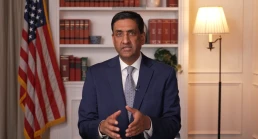The military calls, and Congress answers.
By Jack Crosbie, Discourse Blog
We are living through turbulent times in history: a global network of proxy wars, political violence, targeted killings, shakeups to political norms and wide shifts in the electorate. But some things stay the same, like the United States’ gargantuan military budget.
It’s good that there are some Democratic lawmakers who are pushing back against the ban on gender affirming care for military dependents. But if that is their only reservation to a nearly $900 billion military budget, then it’s just another indication that the status quo in the United States is not changing anytime soon.

The problems with this prioritization of American tax dollars are endless, and the criticism come easy. (It’s tempting, for instance, to joke about Trump’s proposed “Department of Government Efficiency,” but that assumes that DOGE is actually about what it says it’s for and not just funneling federal money into privatized industries.) What it says to me, rather, is that it’s far too soon to hope that the political upheaval of a second Trump administration will provoke any large-scale adjustment of the average politician’s political sensibilities. They believe in the good of the American Empire — and in a few short years, it may be all we have left.
I am sure that Democrats in Congress and the Senate will organize all kinds of legislative resistance to the Trump trifecta — some of it, perhaps, will even be useful. But year after year, they’ll keep voting for the same defense budget. They’ll vote for it as far right elements of our country and government erode their power to resist in any way. They’ll vote for it as the military budget itself is further funneled toward private defense contractors and away from the actual people who serve. (It’s worth noting that the justification for the increase in the budget year-over-year, this year at least, is to bring junior enlisted members’ salaries up to a level that’s competitive with the private sector, or in simpler terms to a level where families on base aren’t having to use food stamps — as if the military couldn’t have found room for those increases anywhere else in the over $800 billion they got last year.)
Recent Posts
Ford worker suspended after confronting President Trump over Epstein files during Michigan plant visit
January 15, 2026
Take Action Now A viral exchange inside a union auto plant has triggered union scrutiny, political backlash, and renewed questions about the…
ICE Detention Expands Dramatically; 70,000 Immigrants Now Jailed, Deaths Increase
January 15, 2026
Take Action Now Four more people have already died in detention in just the first two weeks of 2026.By Amy Goodman and Aaron Reichlin-Melnick,…
‘ICE Has Gone Rogue’: Khanna Demands Arrest, Prosecution of Jonathan Ross for Murder of Renee Good
January 14, 2026
Take Action Now “We need to hold ICE accountable and we need to uphold human rights in ICE facilities. This is the time for Americans to speak up.”……
Right Message, Wrong Messengers: A Brief History Of Oil And U.S. Empire In Iran
January 14, 2026
Take Action Now Since 1979, the U.S. has pursued policies aimed at ensuring the failure of the Iranian Revolution.By Eric Ross, Z Network Multiple…




